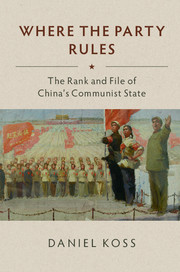Book contents
- Frontmatter
- Contents
- List of Figures
- List of Tables
- Acknowledgments
- PART I AUTOCRATIC GRASSROOTS POLITICS
- PART II THE PARTY IN CONTEMPORARY CHINA
- PART III THE PARTY'S ORIGINS
- PART IV THE PARTY IN THE MAO ERA
- 7 Can the CCP Disobey? The Great Leap Famine (1958–1961)
- 8 The CCP and Regime Survival in Times of Crisis (1967–1969)
- 9 Conclusion
- Appendix 1 Party-versus-Bureaucracy Model
- Appendix 2 Party Growth Model
- Notes
- Primary Material
- Secondary Sources
- Index
7 - Can the CCP Disobey? The Great Leap Famine (1958–1961)
from PART IV - THE PARTY IN THE MAO ERA
Published online by Cambridge University Press: 21 April 2018
- Frontmatter
- Contents
- List of Figures
- List of Tables
- Acknowledgments
- PART I AUTOCRATIC GRASSROOTS POLITICS
- PART II THE PARTY IN CONTEMPORARY CHINA
- PART III THE PARTY'S ORIGINS
- PART IV THE PARTY IN THE MAO ERA
- 7 Can the CCP Disobey? The Great Leap Famine (1958–1961)
- 8 The CCP and Regime Survival in Times of Crisis (1967–1969)
- 9 Conclusion
- Appendix 1 Party-versus-Bureaucracy Model
- Appendix 2 Party Growth Model
- Notes
- Primary Material
- Secondary Sources
- Index
Summary
To achieve effective authoritarian governance, the best regime party is not one that slavishly implements policies, but one that functions as a self-corrective device, where disobedience limits the devastation brought about by bad policies that delegitimize the regime. Generally speaking, as the result of Leninist discipline, the CCP is not such a party. However, this chapter suggests that China's Great Leap Forward (1958–1961), along with its horrific famine, is a partial exception where the strongest local party cells slowed down implementation. Such party cells were disobedient, because the catastrophic movement occurred less than a decade after the Communist takeover, for which some cadres had risked their lives. Only because at that point in time the CCP's local leadership had not yet fully transformed itself from a party-of-revolutionaries to a party-in-power could we observe foot-dragging. In order for party members to push back, it took policies that were not just bad, but deadly. The pushback against the policy was the exception rather than the rule and had a statistically significant yet substantively small effect. All of this does not bode well for the party: The CCP is closer to an unquestioning implementer than an effective self-corrective device. This sobering result points to the institutional limits inherent to authoritarian regime parties.
Chapters 3 and 4 have shown that strong party grassroots help with implementation. Chapter 8 shows how the party grassroots contributed to regime survival in the midst of the Cultural Revolution turmoil, because party members acted on their own initiative in the interest of political stability. This chapter suggests that in at least one historical instance, some members dragged their feet on self-destructive central policies, thereby (marginally) dampening their catastrophic impact. Only because local experiences of the revolution were still fresh, its legacy influenced the behavior of local cadres, rank-and-file party members, and – possibly to a lesser extent – ordinary citizens. The following Section 7. 1 discusses the Great Leap policies. Section 7. 2 describes local variation in policy implementation and proposes a nuanced hypothesis about this variation, to be tested in Section 7. 3.
- Type
- Chapter
- Information
- Where the Party RulesThe Rank and File of China's Communist State, pp. 243 - 261Publisher: Cambridge University PressPrint publication year: 2018



